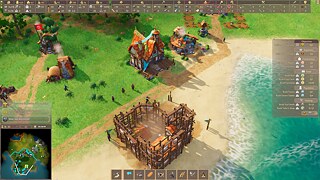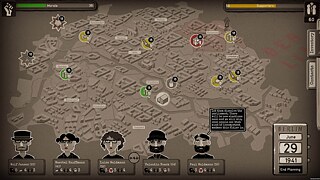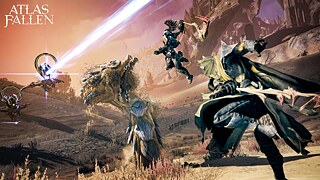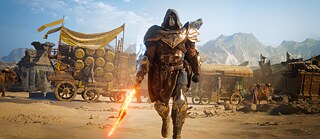Germans like to play games. 53 percent of people over the age of 16 regularly play video games. And with a turnover of almost six billion euros, the gaming industry is now a significant economic factor. But which games come from Germany? And what makes them “typically German”?
Things get off to a leisurely start: small craftsmen scurry through a medieval village, bringing wood from the nearby forest to the local sawmill. A quarry is being built next door and a farm is being built on the neighbouring meadow. Later, blacksmiths, clothiers and representatives of other trades are added. And after a few hours of play, a lively little town full of bustling activity has sprung up where there was just a green meadow.This scenario can be found in the German video game Pioneers of Pagonia. It continues the tradition of games that began with the Siedler series and is now also very popular internationally. These games belong to the “building simulation” genre. Players have to build a city and manage resources such as production facilities. Volker Wertich is both the inventor of the first Siedler game and the man behind Pioneers of Pagonia. The German game developer is convinced that building simulation games are not typically German, but an international phenomenon.

Not coincidentally reminds of the Settlers series: "Pioneers of Pagonia" | © Envision Entertainment
From tables to knowledge transfer
When Volker Wertich thinks of “typically German”, he thinks of earlier video games: “There was a huge wave of manager games in particular, some of which were really number-heavy and had lots of tables and figures. They were very successful in Germany, but not so much in the rest of the world, I think.”On closer inspection, this heritage can also be found in the Pioneers. The world looks cosy, even romantic – but the complex raw material, goods and production chains also need to be managed. In the end, it is precisely this mixture that has fans so enthusiastic and is perhaps somehow “typically German”.
A German flagship game from a different category is Through the Darkest of Times. It tells the story of people who put up resistance during the Nazi era. Although the characters and events are fictional, the game manages to convey knowledge about the time and the situation of resistance fighters. This is not just an ordinary strategy game, but also a so-called serious game.

Through the Darkest of Times | © Paintbucket Games
Through The Darkest of Times is much more than just a serious game. It tells the story of a resistance group in a touching way and at the same time requires players to make strategic decisions. Round after round, the aim is to manage the increasingly scarce resources of the resistance fighters. In the game, characters have life points and certain abilities such as persuasion or strength. The player has to manage these abilities according to the danger of upcoming missions.
“One genre that influenced me a lot was German economic simulations, and Through the Darkest of Times also has a bit of that, the cycle of an economic simulation,” says Jörg Friedrich. “I do certain things, I give instructions and then I find out the result of my actions after a round of the game.”
The love of administrative procedures is therefore the German core that both Pioneers of Pagonia and Through the Darkest of Times share. However, it must be noted at this point that this core is not visible at first glance and only reveals itself on closer inspection.
Action game in German
In addition to these great games, the German gaming scene has even more to offer, most notably Atlas Fallen. The action role-playing game differs from the two aforementioned games in every respect. At first glance, mainly because it is a larger production. Atlas Fallen is a great journey through an impressive world with fast-paced action battles that require strategic skill from the players and allow them to explore a varied landscape on their own.Atlas Fallen is therefore certainly a flagship title from Germany. However, it cannot compete with the big international blockbusters in terms of production size. Atlas Fallen is an AA title, whereas the giants of the genre such as Elden Ring or Horizon are AAA titles.

Can (almost) compete with the greats of its genre: „Atlas Fallen“ | © Deck13 Interactive
However, in order to play along with the really big AAA titles and at the same time guarantee a secure future for smaller studios, the financing of the gaming scene in Germanywould have to be boosted. This would certainly open up new fields that could be called “typically German”.
Through the Darkest of Times / Windows, macOS, Playstation, Xbox, Switch, iOS, Android / first released 2020 / USK: 12 years and up
Atlas Fallen / Windows, Playstation 5, Xbox Series X / 2023 / USK: 12 years and up
* The USK (Entertainment Software Self-Regulation Body) is the official German organization responsible for rating the age suitability of video games and other entertainment software. It assigns age ratings based on content, ensuring that games are appropriate for different age groups.
October 2024
